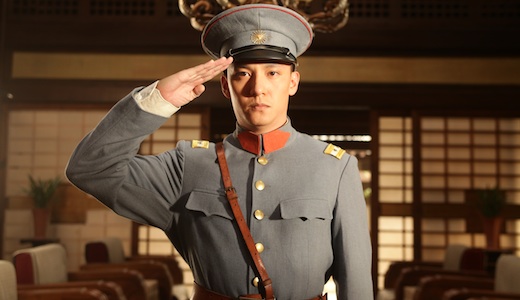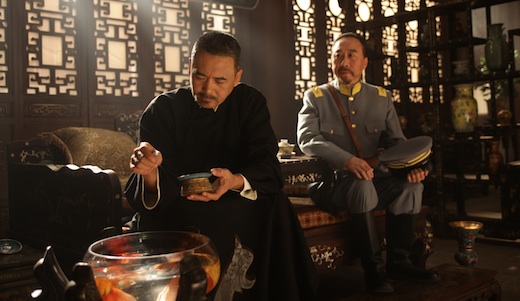As a piece of state-sanctioned propaganda, Beginning of the Great Revival must be taken on face value for what it is. The film states its position early and never wavers from this conviction, but as a piece of narrative storytelling it will simply confuse and bore most viewers outside the target market.
 Cinema history is filled with propaganda films that are now considered to be great pieces of filmmaking, regardless of their politics or moral ambiguity. From 1915’s Birth of a Nation, a three hour silent epic that glorified the Ku Klux Klan, through Soviet flag-waver Battleship Potemkin and Leni Riefenstahl’s Nazi home movie Triumph of the Will, filmmakers have used the power of film to convey their own or the state’s political leanings in an often less-than-subtle fashion. The state owned and tightly controlled China Film Group commissioned The Founding of a Republic to mark the 60th anniversary of the People’s Republic of China, featuring a star-studded cast including Andy Lau, Ge You, Jackie Chan and Jet Li, and directors Jiang Wen, Chen Kaige and John Woo. Marking the 90th anniversary of the Communist Party of China, Beginning of the Great Revival (known as The Founding of a Party in its homeland) acts as a kind of prequel to that earlier film.
Cinema history is filled with propaganda films that are now considered to be great pieces of filmmaking, regardless of their politics or moral ambiguity. From 1915’s Birth of a Nation, a three hour silent epic that glorified the Ku Klux Klan, through Soviet flag-waver Battleship Potemkin and Leni Riefenstahl’s Nazi home movie Triumph of the Will, filmmakers have used the power of film to convey their own or the state’s political leanings in an often less-than-subtle fashion. The state owned and tightly controlled China Film Group commissioned The Founding of a Republic to mark the 60th anniversary of the People’s Republic of China, featuring a star-studded cast including Andy Lau, Ge You, Jackie Chan and Jet Li, and directors Jiang Wen, Chen Kaige and John Woo. Marking the 90th anniversary of the Communist Party of China, Beginning of the Great Revival (known as The Founding of a Party in its homeland) acts as a kind of prequel to that earlier film.
Starting in 1911 with the uprising in the southwestern province of Szechwan, Beginning of the Great Revival traces the history of the Communist Party of China. As the Ch’ing Dynasty falters and wobbles on its last legs, Yuan Shikai (Yun-Fat Chow, Pirates of the Caribbean: At World’s End) and his reorganised military is ushered in as a virtual dictator of China until his death in 1916. During the period of warlordism from 1917 to 1921, with the parallel October Revolution in Russia, the roots of the Communist Party of China, and the early rise of Mao Tse-Tung (Ye Liu, A Beautiful Life) are explored.
While China certainly doesn’t have a monopoly on jingoism, with recent efforts Battle: Los Angeles and the forthcoming Captain America: The First Avenger laying down patriotism in an explosive fashion, there is a sledgehammer like quality to Beginning of the Great Revival that is far removed from those action-packed crowd-pleasers. The film is not so much a feature narrative as a string of scenes with a definite message: China was a mess until the Party began. Skimming over years worth of movements in a matter of minutes, the reportedly greatly edited feature (said to be too long for a theatrical release otherwise) uses a series of on-screen names and title cards to report on fairly monumental events that are happening off-screen. Given that this is a completely unabashed positive piece of propaganda, aimed largely at a presumably uncritical local audience, a fair bit of assumed knowledge is required in order to fully appreciate the events as they unfold. Yet a full comprehension of history is not required here, and the producers are not really expecting one to be a scholar in Chinese history. Indeed, by lurching from one dramatic moment to the next, the more obvious cracks in the system are brushed aside in favour of the glorious ending, which actually skips 20 further years of turmoil.
As a film, Beginning of the Great Revival is disappointingly uninspiring. Despite a level of access to China and its monuments that other filmmakers could only dream of, the cinematography is often flat and dull, with an uncomfortable emphasis on the computer generated backgrounds that stick out like a sore thumb. There are, however, the odd magnificently staged army scenes, which would look even more inspiring on the IMAX screens that it was intended to be seen on, but these are all too brief. The performances and moments range from the extremes of political speech-giving to Douglas Sirk style melodrama – complete with the focused light around the eyes, depending on the moment – and it is amazing how beautiful everybody in the early Communist Party of China was! Despite featuring a cast of well over 100 well-known Chinese actors, including the internationally recognised Yun-Fat Chow and the ubiquitous Andy Lau (already seen in Shaolin and What Women Want this year), the bigger names have all too short a stay. Ye Liu, graduating from Red Army Soldier in The Founding of a Republic all the way to Mao in this film, delivers a competent enough performance but his character, much like the film itself, is all about capturing the ‘untarnished’ view of Chinese history rather than revealing any dramatic truth.
Beginning of the Great Revival was released in Australia on 23 June from China Lion.
If you care about seeing Asian cinema in Australia on the big screen, we encourage you to go out and support the regular screenings at selected Event Cinemas and the regular Asian Cinema screenings at Hoyts Cinemas. Increasingly they are day-and-date with their Chinese release, so there are no excuses for that ‘other method’ of acquiring them.






Believe me, it doesn’t surprise me that it’s dull. A couple of mates and I went to see The Founding of a Republic a while ago (thinking it would be at the very least, hilariously bad) and all ended up taking turns nodding off throughout. There were a few moments of unintentional comedy – like a stilted cameo from Zhyi Zhang, who tells Mao how “excited” the new Chinese flag makes her – but otherwise, it was a slow, excruciating bore.